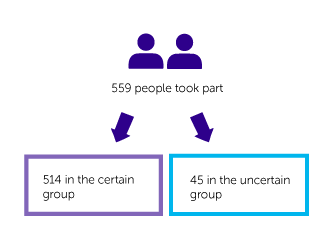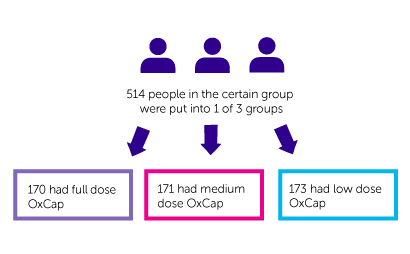A trial looking at chemotherapy for people with advanced cancer of the stomach or food pipe (GO2)
Cancer type:
Status:
Phase:
This trial was done to find the best way to treat people with cancer of the stomach or food pipe (oesophagus) who are not well enough for standard chemotherapy. It was supported by Cancer Research UK.
The trial was open for people to join between 2014 and 2017, and the team presented the results at a conference in 2019.
More about this trial
Doctors often treat advanced cancer of the stomach (gastric cancer) or cancer of the food pipe (oesophagus) with chemotherapy. When this trial was done, doctors commonly used a combination of drugs called EOX. This is made up of the drugs epirubicin, oxaliplatin and capecitabine (Xeloda).
Some people find EOX a difficult treatment to cope with physically, especially if they are older and have other medical conditions. Doctors thought it may be better for some people to have less chemotherapy, or to have other treatment to control the symptoms (best supportive care).
In this trial, researchers looked at a treatment plan that includes oxaliplatin and capecitabine (OxCap), but not epirubicin. They compared different doses of OxCap, to see which one was best to use. They had already done a trial to see which combination of treatment was best to look at in more detail.
The main aim of this trial was to find out the best way to treat people with advanced cancer of the stomach or oesophagus, who are older or more frail.
Summary of results
The research team found that:
- low dose chemotherapy is as good as medium or full dose treatment for those most likely to benefit from chemotherapy
- it is acceptable to treat people less likely to benefit from chemotherapy with best supportive care
Trial design
The people who took part in this trial all had advanced cancer of the stomach or oesophagus, and were due to have treatment. Their doctors thought they were too frail to have the usual full dose EOX chemotherapy.
They were put into 2 groups to begin with. This was based on how likely it was that they would benefit from chemotherapy.
The people most likely to benefit from chemotherapy were put into 1 of 3 treatment groups at random. The researchers called this the ‘certain’ group. They had either:
- full dose (level A dose) OxCap
- medium dose (level B dose) OxCap
- low dose (level C dose) OxCap
The people who were less likely to benefit from chemotherapy were put into 1 of 2 treatment groups at random. The researchers called this the ‘uncertain’ group. They had either:
- low dose (level C dose) OxCap and best supportive care (BSC)
- best supportive care
Results
A total of 559 people took part in this trial:
- 514 who were very likely to benefit from chemotherapy (the certain group)
- 45 who may not benefit from chemotherapy (the uncertain group)
There were 514 people in the certain group:
- 170 had full dose OxCap
- 171 had medium dose OxCap
- 173 had low dose OxCap
- 7.5 months for those who had full dose
- 6.7 months for those who had medium dose
- 7.6 months for those who had low dose
There isn’t much difference between the three groups. So the research team concluded that low dose chemotherapy worked as well as higher dose chemotherapy for this group of patients.
When they looked at side effects, they found that fewer people who had the low dose of chemotherapy had side effects.
They also looked at quality of life. They found that people’s quality of life went down a bit in all 3 groups. But it went down the least for people who had the lowest dose of chemotherapy.
Conclusion for the certain group
The research team concluded that low dose OxCap was as good as medium or full dose chemotherapy. They recommend that it could be used as a treatment for people who are likely to benefit from chemotherapy but are older or too frail to have full dose EOX chemotherapy.
How well treatment worked – the uncertain group
There were 45 people in the uncertain group:
- 23 had low dose OxCap and best supportive care
- 22 had best supportive care
The people who had chemotherapy lived slightly longer. But it wasn’t a big enough difference to say for sure that it was because of the treatment. It could have been due to chance.
When they looked at the side effects people had, they found that more people who had chemotherapy had side effects.
They also looked at quality of life. They found that it had gone down a bit in both groups. But it had gone down a bit less in those who had chemotherapy.
Conclusion for the uncertain group
The research team concluded that it is acceptable to treat older and more frail patients with best supportive care, rather than chemotherapy.
Where this information comes from
We have based this summary on information from the research team. The information they sent us has been reviewed by independent specialists ( ) but may not have been published in a medical journal. The figures we quote above were provided by the research team. We have not analysed the data ourselves.
) but may not have been published in a medical journal. The figures we quote above were provided by the research team. We have not analysed the data ourselves.
Recruitment start:
Recruitment end:
How to join a clinical trial
Please note: In order to join a trial you will need to discuss it with your doctor, unless otherwise specified.
Chief Investigator
Professor Matt Seymour
Dr Peter Hall
Supported by
Cancer Research UK
Experimental Cancer Medicine Centre (ECMC)
NIHR Clinical Research Network: Cancer
St James's University Hospital
University of Leeds
Other information
This is Cancer Research UK trial number CRUK/12/022.
If you have questions about the trial please contact our cancer information nurses
Freephone 0808 800 4040







